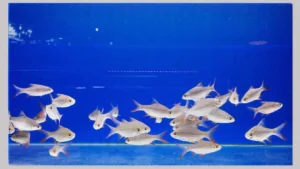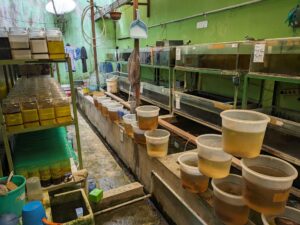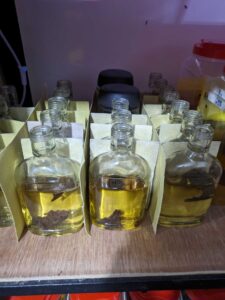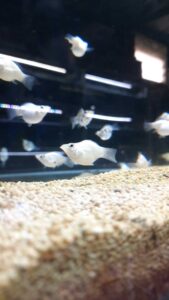Showcasing the Wild: Work Package 2
Ornamental Fish Value Chains
- Work Package 2
Exploring the Nuances Involved in a Longterm Ornamental Fish Value Chain
The work package explores the nuances of the ornamental fish value chain from East Asia/ South East Asia, Africa and Latin America to Europe from 1870 to date. It investigates how ichthyomorphology evolved the value chain and co-evolved with modern technology between 1870 and today.It will identify the critical actors, the cause-and-effects relationships between the critical actors, institutions, processes and improvements in this historical evolution.
More-Than-Human Perspectives
The project will draw on animal geography as a sub-discipline in geography dwelling on more-than-human approach drawing on Actor-Network Theory (ANT) as a concept to unpack the roles played by non-humans actors (fish morphology, modern technology, fish food, etc.) in establishing the value chain. It will additionally trace the roles played by human actors in the value chain.
- Work Package 2
Focus questions
The work package addresses the following questions:
How have actors’ roles in the value chain evolved over time?
What effects have fish characteristics had on human behavior?
How has the value chain shaped the world trading hubs?
Background
- Are you in the know that the history of trade with live fish and their domestication started from China in 1200s and it has undergone a global value chain?
- Are you familiar with the fact that ornamental fish were transported from the tropics to some countries like Germany, England and the US?
- Are you aware that their physical characteristics (coloration, fin shapes, etc.) and behavioral characteristics attracted interest and led to a domestication of many species today by humans?
- Did you know that tropical fresh water fish species are the most traded live animals and is a multi-billion dollar venture today?
- Do you have any clue that tropical freshwater fish serve human education, entertainment and ornamental purposes?
- Have you been told that ornamental fish are either bred in ponds or caught from the wild?
Tropical fish have been involved in a global value chain for more than a century. The morphology of fish (attractive shapes and sizes, modified gills, intestinal breathing, etc) and their tolerance to lower water and/or quickly changing water temperatures attracted enthusiasts into keeping them; many of these enthusiasts have been Europeans. Fish were initially transported to Europe through ship at a convenient water temperature; a level in accordance with the higher environmental temperatures found in the tropics. Technologies like electric heaters, pumps and filters were considered to control water chemistry given the cooler weather conditions in Europe to make them climatic-variation-and-temperature tolerant, provide adequate oxygen and remove physical and soluble chemicals from aquaria. Fish food like flake food (invented by Tetra in Germany in the 1950s) and Artemia which provides the dietary requirement of food for the fish species were provided and properly dispensed for sustenance in the aquaria. Moreover, the establishment of institutions like the International Union for the Conservation of Nature (IUCN) and Convention on International Trade in Endangered Species of Wild Flora and Fauna (CITES) were also necessary because they took action at protecting the welfare of live animals by promoting standards in commodification and standardization operations. They also checked freshwater fish trade; making sure that all imports, exports and re-exports were authorized by means of permits and certifications. These processes fish went through drastically reduced fish stress and mortality, contributed substantially to world trading hubs and economies of nations and have eventually influenced human behavior.
The study will consider more-than-human approaches taking Actor Network Theory (ANT) as an important concept of animal geography to investigate about how ornamental fish morphology and characteristics evolved and co-evolved with the other actors in the value chain between 1870 and today. It will identify critical actors, the cause-and-effect relationships among the actors, institutions, processes, and improvements that have shaped this historical evolution. It will also unpack the resultant development outcomes, particularly human-wildlife relations. This study contributes to a nuanced understanding within a long-term perspective of how value chain processes through to animal domestication took place overtime.
Since England and Germany are known to have imported large numbers of fresh water fish and have enough and available publications on the commodification and domestication practices of fresh water fish and on aquarium keeping and maintenance, the research work will take Germany and England as case studies.
Involved Members

Prof. Dr. Boris Braun
Principal Investigator: Showcasing the Wild: Commodification and Standardization in Tropical Freshwater Fish Value Chains – Current and Historical Perspectives
Project Manager of Work Package 2: Ornamental Fish Value Chains
Prof. Dr. Boris Braun
Boris Braun holds a chair in human and economic geography. His main areas of interest are the relationship between economy and ecology, the social and economic impacts of climate change as well as regional development and the consequences of globalisation for the Global South.
Research interests: Environmental Economic Geography, Environmental Management, Industrial and Urban Change, Environmental and Social Impacts of Globalization, Southern and Southeastern Asia, West Africa, Australia, Germany, and Western Europe
Email: boris.braun@uni-koeln.de
Tel.: +49 221 470 4141

Edward Ofori-Annor (M.A.)
Doctoral Researcher: Showcasing the Wild: Commodification and Standardization in Tropical Freshwater Fish Value Chains – Current and Historical Perspectives
Project Manager of Work Package 2: Ornamental Fish Value Chains
Edward Ofori-Annor (M.A.)
Research interests: Human and Economic Geography, Historical Geography, Global North-South relations, Value Chain Analysis, Sub-Saharan Africa
Contact: eoforia1@uni-koeln.de



